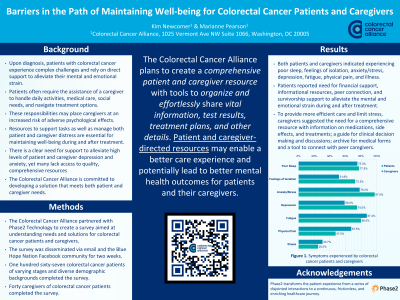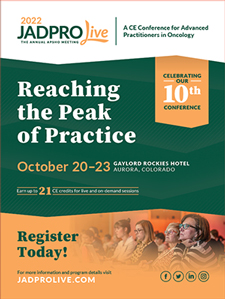Back


APSHO Patient Perspective Posters
JL1002P: Barriers in the Path of Maintaining Well-being for Colorectal Cancer Patients and Caregivers
Saturday, October 22, 2022
10:00 AM – 11:00 AM ET

Has Audio

Kendra Mitchell
Volunteer
Colorectal Cancer Alliance
Poster Presenter(s)
Background:
Colorectal cancer is the third-most commonly diagnosed cancer and the second-leading cause of cancer death in men and women combined in the United States. Upon diagnosis, patients with colorectal cancer experience complex challenges and rely on direct support to alleviate their mental and emotional strain. The assistance of a caregiver is often required to handle daily activities, medical care, social needs, and navigate treatment options. These responsibilities may place caregivers at an increased risk of adverse psychological effects. Resources to support these tasks as well as manage both patient and caregiver distress are essential for maintaining well-being during and after treatment. Previous studies have elucidated clear needs for support and high levels of patient and caregiver depression and anxiety, yet many lack access to quality, comprehensive resources.
Methods:
A survey aimed at understanding needs and solutions was disseminated via the Colorectal Cancer Alliance's Blue Hope Nation community for two weeks and by email. One hundred sixty-seven colorectal cancer patients and forty caregivers of colorectal cancer patients completed the survey.
Results:
Both patients and caregivers experienced detrimental psychosocial effects during and after treatment for colorectal cancer related to their emotional, financial and informational needs. The majority indicated experiencing poor sleep (75.3%), feelings of isolation (51.8%), anxiety/stress (78.3%), depression (59.0%), fatigue (87.4%), physical pain (67.5%), fear (73.5%), memory and concentration issues (72.3%), and a change in eating habits (53.0%). For the 40 caregivers, a majority reported experiencing anxiety/stress (97.5%), fatigue (80%), poor sleep (77.5%), depression (75%), and feelings of isolation (72.5%). Patients reported need for financial support, informational resources, peer connection, and survivorship support to alleviate the mental and emotional strain during and after treatment. To provide more efficient care and limit stress, caregivers suggested the need for a comprehensive resource with information on medications, side effects, and treatments; a guide for clinical decision making and discussions; archive for medical forms and a tool to connect with peer caregivers.
Conclusions:
The survey results highlight numerous barriers for patients and their caregivers as they navigate cancer, and indicate the necessity to create a resource to alleviate those areas of stress. Based on this input, the Colorectal Cancer Alliance plans to create a comprehensive patient and caregiver resource with tools to organize and effortlessly share vital information, test results, treatment plans, and other details. Such patient and caregiver-directed resources may enable a better care experience and potentially lead to better mental health outcomes for patients and their caregivers.
Colorectal cancer is the third-most commonly diagnosed cancer and the second-leading cause of cancer death in men and women combined in the United States. Upon diagnosis, patients with colorectal cancer experience complex challenges and rely on direct support to alleviate their mental and emotional strain. The assistance of a caregiver is often required to handle daily activities, medical care, social needs, and navigate treatment options. These responsibilities may place caregivers at an increased risk of adverse psychological effects. Resources to support these tasks as well as manage both patient and caregiver distress are essential for maintaining well-being during and after treatment. Previous studies have elucidated clear needs for support and high levels of patient and caregiver depression and anxiety, yet many lack access to quality, comprehensive resources.
Methods:
A survey aimed at understanding needs and solutions was disseminated via the Colorectal Cancer Alliance's Blue Hope Nation community for two weeks and by email. One hundred sixty-seven colorectal cancer patients and forty caregivers of colorectal cancer patients completed the survey.
Results:
Both patients and caregivers experienced detrimental psychosocial effects during and after treatment for colorectal cancer related to their emotional, financial and informational needs. The majority indicated experiencing poor sleep (75.3%), feelings of isolation (51.8%), anxiety/stress (78.3%), depression (59.0%), fatigue (87.4%), physical pain (67.5%), fear (73.5%), memory and concentration issues (72.3%), and a change in eating habits (53.0%). For the 40 caregivers, a majority reported experiencing anxiety/stress (97.5%), fatigue (80%), poor sleep (77.5%), depression (75%), and feelings of isolation (72.5%). Patients reported need for financial support, informational resources, peer connection, and survivorship support to alleviate the mental and emotional strain during and after treatment. To provide more efficient care and limit stress, caregivers suggested the need for a comprehensive resource with information on medications, side effects, and treatments; a guide for clinical decision making and discussions; archive for medical forms and a tool to connect with peer caregivers.
Conclusions:
The survey results highlight numerous barriers for patients and their caregivers as they navigate cancer, and indicate the necessity to create a resource to alleviate those areas of stress. Based on this input, the Colorectal Cancer Alliance plans to create a comprehensive patient and caregiver resource with tools to organize and effortlessly share vital information, test results, treatment plans, and other details. Such patient and caregiver-directed resources may enable a better care experience and potentially lead to better mental health outcomes for patients and their caregivers.

